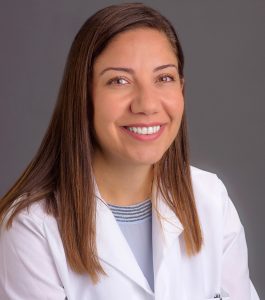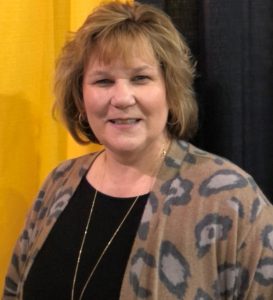Published on
We continue to feature members of the Mizzou community who have shown extraordinary leadership and adaptability over the last year.

Dima Dandachi, MD, MPH, Assistant Professor of Medicine, Division of Infectious Diseases, Department of Medicine
Dr. Dandachi is the Medical Director of the HIV/AIDS program at MU Health Care and Medical Director of the Outpatient Antimicrobial Therapy (OPAT) and Vascular Access Team. In 2020, Dr. Dandachi received the honors of Outstanding Clerkship Didactic at the University of Missouri; the Delta Omega Honorary Society in Public Health from the University of Texas’ School of Public Health; and she was selected as one of the University of Missouri’s Presidential Engagement Fellows.
Working in infectious diseases during a pandemic puts a doctor’s skills, training and knowledge to the test, while also trying to stay on top of the latest information that was constantly changing. Dr. Dandachi explains, “The first challenge was: how do we minimize the disruptions to care for our patients and how to do we facilitate frequent communication and outreach. For me particularly, I care for people with HIV, this venerable group of patients, some of them lived through the peak of the HIV epidemic, who were really concerned about their wellbeing, about the possibility that if they come to see a doctor they might be risking their lives. But also, they were very concerned about having shortage in HIV medications, a medication that kept them alive.” These patients were able to meet with doctors via telehealth to ensure their prescription refills could be completed on time.
Dr. Christian Rojas, division director for Dr. Dandachi, says of her clinical skills: “As medical director of two important clinical programs—the OPAT (outpatient parenteral antimicrobial therapy) program and the HIV/AIDS program—she ensured that these patient populations received excellent care during the pandemic.”
As far as treatments for COVID-19, Dr. Dandachi says, “Another important challenge is to ensure equitable and timely access to therapeutics, clinical trial participation, and vaccination for COVID-19. We tried every single opportunity to bring clinical trials to MO, and when we had very limited options available for treatment, we worked to try to get remdesivir, convalescent plasma, COVID-19 vaccination and so on.” Dr. Rojas says that she brought in a COVID-19 vaccine trial to MU and enrolled more than 100 people, “a historic milestone in the history of the Clinical Research Center.”
Her team continued on, working together, keeping up with the latest medical literature to treat their patients with evidence-based practices, but Dr. Dandachi also learned that we were not ready for a pandemic and need to better prepare in the future. Another important lesson she learned is, “Despite all the advances in medicine, not everyone is benefiting. Health disparities are significant, among different racial and ethnic groups, socioeconomic, rural vs. urban, and we are not doing enough to close these gaps. We should focus in the future on how to reduce these gaps and how to improve access to care for all.”
“Dr. Dandachi went above and beyond during the pandemic, advancing our clinical, research and education missions,” says Dr. Rojas. “In research, Dr. Dandachi described the characteristics and outcomes in a multicenter registry of patients with HIV and COVID-19. She was the first author of this publication in one of our premier journals in infectious diseases: Clinical Infectious Diseases.”

Carla Whitney, Assistant Registrar Scheduling and Catalog
In the fall of 2020, classes were offered in a totally new way. To offer a safe environment for students and instructors, classroom capacities were limited to support social distancing and classes were offered in a variety of new and different formats. To say this added a new degree of complexity when scheduling the semester would be to put it lightly. Carla Whitney explains that, instead of the normal four months it took to assemble the schedule, for Fall 2020, her team had one month “to work with departments to change the modality of 17,000 plus sections either to online, face-to-face or a combination of both. With the help of my team and the departments we were able to work spreadsheets, making room edits, adjusting modalities, and in some cases days of the week to provide the students the most beneficial semester with the transition we were facing for Fall 2020.”
Whitney explains how they tackled the workload while her staff was also working from home: “Since we were not in the office, we had to use Microsoft teams and Zoom to have weekly updates, my staff— Jessica Bowen, Tammy Limbach and Patty Luckenotte—worked as a team to not only complete the project, but really helped to support each other through the project and manage the work load we were facing. I am fortunate to have three exceptional staff members who went above and beyond to not only support me but to realize the importance of our work to support our students, departments, faculty, and staff.”
Their teamwork and diligence paid off. “Carla Whitney and her team did an amazing job of leading the campus through changing our face-to-face class schedule for fall 2020 into an online and hybrid schedule, while students were still enrolling. It took many hours and lots of coordination with the academic units,” explains University Registrar Brenda Selman. “She and her team managed it efficiently and professionally. She and her team are to be credited with keeping MU functioning during the COVID-19 pandemic. Carla’s leadership was outstanding.”
When asked what she took away from academic preparedness planning during a pandemic, Whitney said participating in both the Department Chairs meeting and the Academic Operations group, she gained a better knowledge of how the individual pieces work together to make the entire campus run smoothly. Plus, she says, “The new relationships that I have been able to form will help to impact not only future projects but has created an open line of communication that will benefit us all in the future.”
Adaptability and teamwork helped make the past academic year flexible. While most students and faculty might not realize the scope of the “behind the scenes” work that goes into assembling a classroom schedule, we deeply appreciate the work Carla’s team did. She explains, “My motto throughout this pandemic has been ‘we can only do what we can do’. This experience has been new for everyone and we are all learning together how to navigate the changes, go with the flow, and realize that we are all adaptable, even in a global pandemic.”